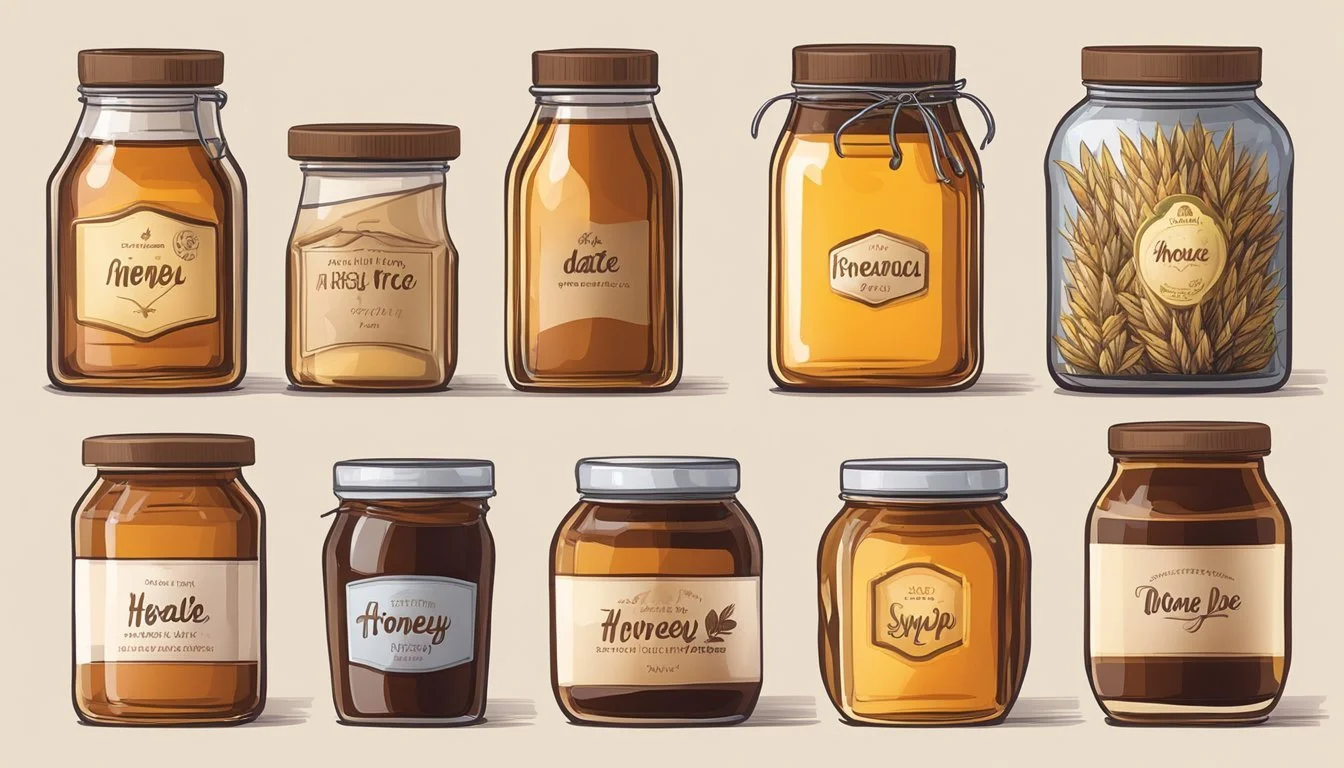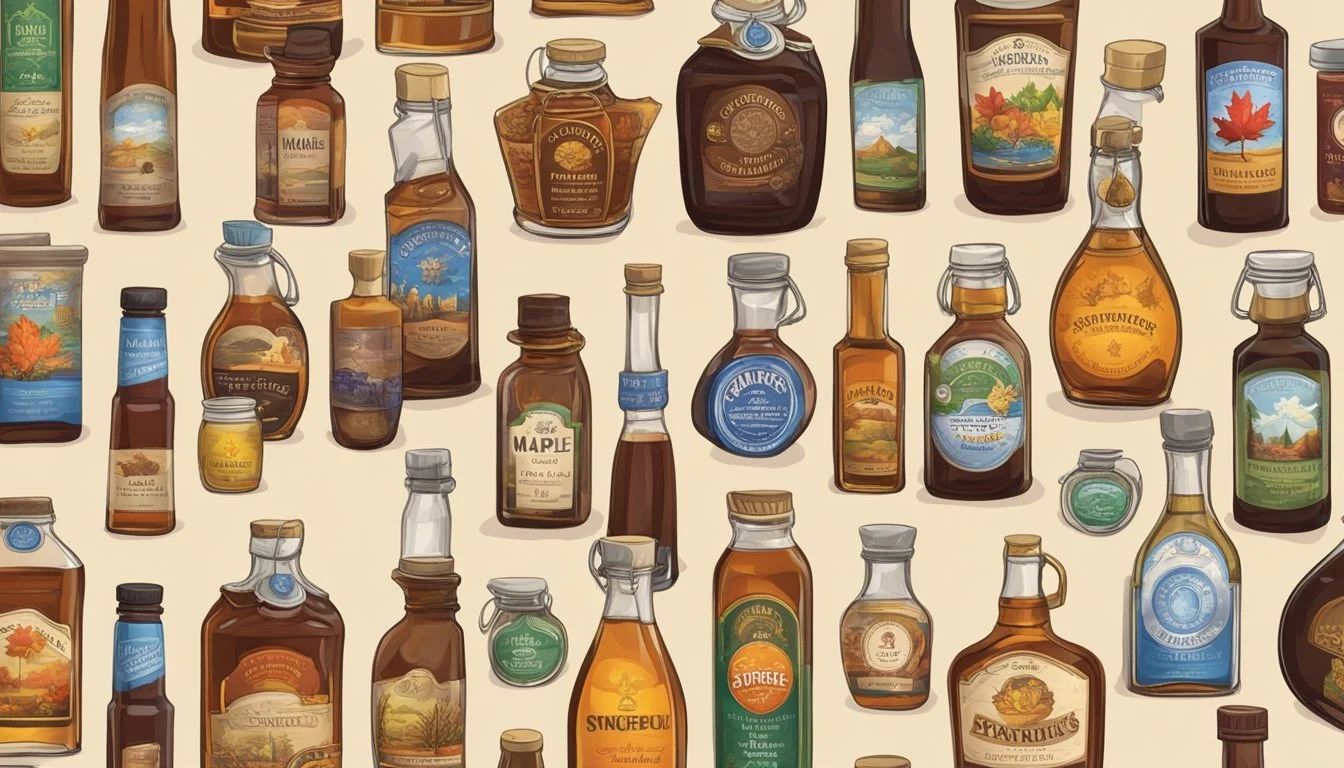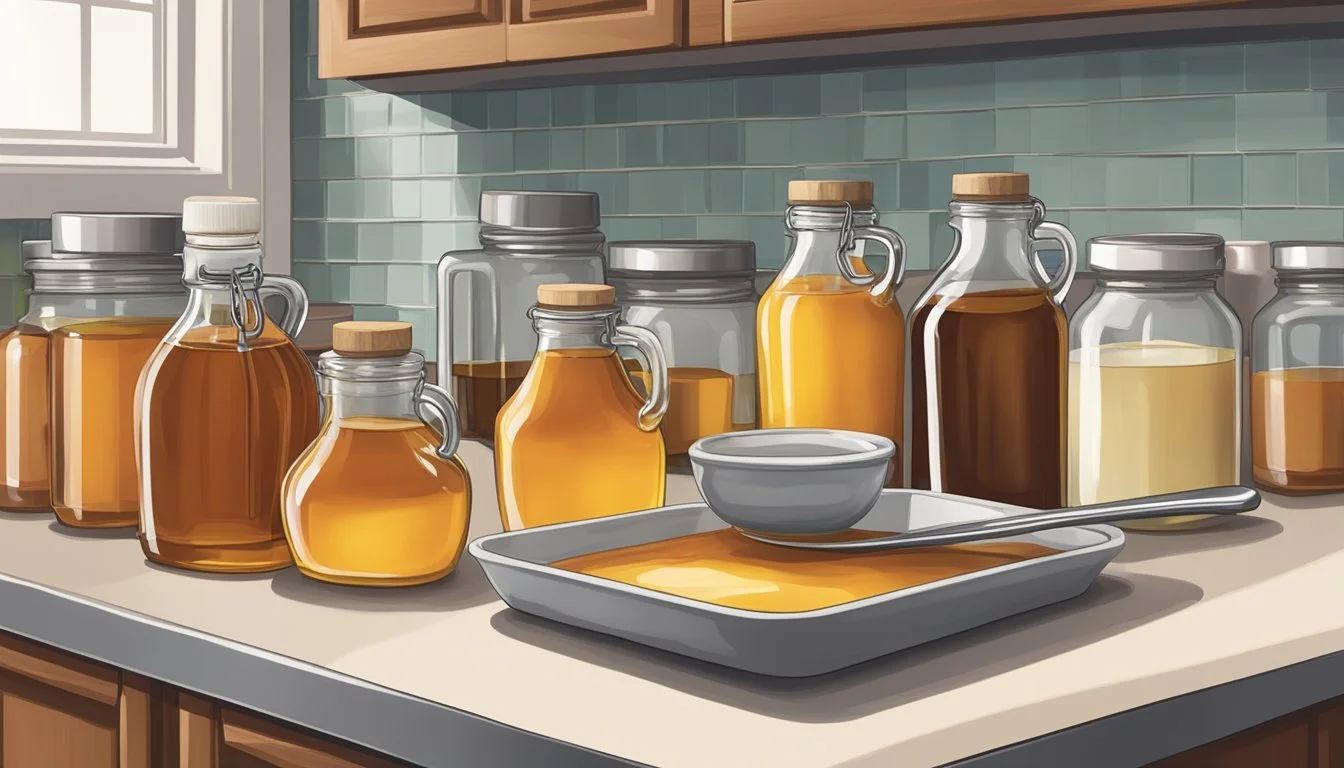Maple Syrup Substitutes
Top Alternatives for Your Sweetening Needs
Maple syrup's distinctive taste and natural sweetness make it a favorite topping and ingredient for a variety of dishes, from classic pancakes and waffles to glazes for meats and sweeteners in baking. However, there are times when this beloved syrup might not be readily available, or dietary preferences require an alternative. In such cases, a variety of substitutes can provide similar sweetness and depth of flavor to recipes calling for maple syrup.
Choosing the right substitute for maple syrup depends on the recipe's requirements and the flavors one hopes to achieve. For example, simple syrup, which is made by dissolving sugar in water, can work as a direct replacement for maple syrup in baking and drink preparations, though it lacks the characteristic maple flavor. Molasses or honey, both thicker and richer in flavor, offer sweetness and can also contribute unique tastes to the dish, with molasses bringing a robust, caramel-like flavor suitable for heartier recipes.
Agave nectar, another natural sweetener, mimics the consistency of maple syrup and provides a similar sweetness, making it a practical choice for many culinary applications. Each substitute brings its own qualities to the table, and understanding these nuances allows for seamless integration into recipes, ensuring the desired outcome is achieved without compromising on taste or texture.
Understanding Maple Syrup and Its Unique Qualities
Maple syrup, with its distinct flavor and versatility, is a natural sweetener beloved in various culinary applications. This section explores maple syrup’s nutritional value, its role in cooking, and specific considerations for its use in baking.
Nutritional Profile and Health Benefits
Maple syrup contains essential minerals such as calcium, potassium, iron, and zinc, contributing to its health benefits. Unlike refined sugars, it offers a source of antioxidants which are compounds that help mitigate oxidative stress in the body. The syrup has a lower glycemic index than regular sugar, meaning it causes a slower rise in blood sugar levels.
Calories: about 52 per tablespoon
Carbohydrates: about 13.4 grams per tablespoon
Specific antioxidants: include manganese and riboflavin
Culinary Uses and Flavor Characteristics
Maple syrup's flavor is distinctly rich, with notes of vanilla and caramel, making it a preferred sweetener for pancakes, waffles, and French toast. Due to its unique taste, maple syrup enhances both sweet and savory dishes, and can also serve as a substitute for honey or sugar in recipes. Its consistency and sweetness make it an important ingredient in creating glazes or marinades for meats and vegetables.
Culinary pairings:
Breakfast items: pancakes, waffles, oats
Baked goods: cookies, pies
Savory dishes: glazes for meats, dressings for salads
Maple Syrup in Baking
In baking, maple syrup can impart a moist texture and a subtle depth of flavor. It’s important to consider its liquid content when substituting for granulated sugar to maintain the desired consistency of the baked goods. In general, when replacing sugar with maple syrup in baking recipes, the ratio is typically about ¾ cup of maple syrup for every 1 cup of sugar, and the liquid in the recipe should be reduced by about 3 tablespoons to compensate.
Baking specifics:
Reduce oven temperature by 25°F to prevent over-browning.
For each cup of syrup used, reduce added liquids by 2 to 4 tablespoons.
Popular Natural Maple Syrup Substitutes
Natural sweeteners can serve as excellent maple syrup substitutes in various culinary applications. They offer different flavor profiles and sweetness levels, enabling cooks to tailor their recipes to desired tastes and nutritional preferences.
Honey as a Substitute
Honey is a widely available natural sweetener that features a lighter color and a flavor distinct from maple syrup. Its thicker viscosity is suitable for breakfast items and baked goods. It is important to note that honey has a higher glycemic index compared to maple syrup.
In recipes: Substitute 1 cup of honey for every 2/3 cup of maple syrup.
Uses: Particularly good in drinks, salad dressings, and frozen desserts.
Agave Nectar and Syrup
Agave nectar, or syrup, is sourced from the agave plant and offers a lower glycemic index, making it a favored option for those monitoring their sugar intake. It has a similar sweetness to maple syrup, albeit with a milder, neutral flavor.
Consistency: Thin and pourable, similar to maple syrup.
Application: Can be used in an equal ratio as a maple syrup substitute for cooking and baking.
Molasses Varieties
Molasses is the byproduct of sugar refining and can mimic maple syrup's robust flavor and consistency. It contains nutrients such as calcium and iron. Despite being less sweet, it's an effective substitute for maple syrup in recipes.
Types: Blackstrap molasses is darker and more bitter, while lighter varieties are sweeter.
Recommendation: Use in a 1:1 ratio but adjust sweetness level according to taste.
Coconut Nectar
Coconut nectar is derived from the sap of coconut trees and is considered a vegan-friendly choice. It boasts a caramel-like flavor with a less intense sweetness compared to maple syrup. Its consistency is versatile for drizzling and baking.
Sweetness: Naturally less sweet, may require more quantity to achieve desired sweetness in recipes.
Health benefit: Often chosen as a natural sweetener with a lower glycemic index.
Sugar-Based Maple Syrup Alternatives
In recipes where maple syrup is called for, sugar-based alternatives can offer similar sweetness and consistency. These can be made at home or found in stores and are often utilized for their availability and cost-effectiveness.
Brown Sugar and Its Syrup
Brown sugar syrup is crafted by combining brown sugar with water and heating the mixture to create a thick, sweet liquid. To achieve a maple-like flavor, one can add a touch of vanilla or maple extract. The amounts typically used are:
1 ½ cups brown sugar
1 cup water
This mixture should be heated until boiling and then simmered for 4-5 minutes until it reaches the desired consistency. The caramel flavor of brown sugar provides a richness akin to maple syrup.
White Sugar Solutions
White sugar solutions often involve creating a simple syrup by dissolving white sugar in water. This syrup provides a clear and neutral sweet taste that is versatile:
1 cup white sugar
1 cup water
Heat until the sugar has dissolved, and then allow the syrup to thicken to the desired level. While it lacks the complex flavors of maple syrup, it can be a suitable substitute when sweetness is the primary goal.
Corn Syrup in Sweetener Roles
Corn syrup, with its smooth texture, is frequently employed as a sweetener in various culinary applications. Its consistency is remarkably similar to that of maple syrup, making it a reasonable substitution in many recipes. It offers a moderately sweet taste and can carry other flavors well, yet it may not contribute the same depth as maple syrup's unique profile.
Remember that each sugar-based substitute will impart its own distinct taste, and thus, one should select an alternative that aligns with the desired flavor outcome of their dish.
Healthy and Special-Diet Maple Syrup Alternatives
When looking for ways to enjoy the sweetness of syrup without the sugar spike or dietary concerns of traditional maple syrup, consider these health-conscious and special-diet substitutes. They offer alternatives that cater to various nutritional needs while providing a natural flavor.
Stevia and Other Zero-Calorie Options
Stevia is a natural, zero-calorie sweetener derived from the leaves of the stevia plant. Available as a liquid or powdered stevia syrup, it makes an excellent substitute for maple syrup for those monitoring their sugar intake. Stevia syrup has a much sweeter flavor, so less is required to achieve the same level of sweetness, which makes it a healthy substitute with a lower glycemic index.
Pros: Zero calories, suitable for diabetics, natural flavor.
Cons: Can have a slightly bitter aftertaste, may not behave the same in baking as sugar does.
Date Syrup and Yacon Syrup
Date syrup is a wholesome sweetener high in antioxidants and made from concentrated date juice. It is a rich, thick syrup with a deep caramel flavor, fitting for those seeking a vegan-friendly option. Apart from its sweetness, it imparts health benefits due to the presence of minerals like potassium and magnesium.
Yacon syrup is another healthy substitute extracted from the yacon plant's roots. Renowned for its low glycemic index, yacon syrup is suitable for those looking to manage their blood sugar levels. It is also prebiotic, supporting gut health.
Pros: Natural sweetness, additional health benefits, low glycemic index.
Cons: Distinct flavors that may not be neutral in all recipes.
Gluten-Free and Vegan-Friendly Choices
For individuals with gluten sensitivities or those following a vegan diet, finding a syrup substitute that does not compromise on dietary requirements is crucial. Both stevia syrup and date syrup are inherently gluten-free and vegan-friendly. They offer suitable alternatives to maple syrup for those aiming to maintain these specific dietary preferences.
Pros: Suitable for a variety of special diets, often more nutritious than maple syrup.
Cons: May affect the flavor and texture of recipes differently than maple syrup.
Cooking and Baking with Maple Syrup Substitutes
Cooking and baking often rely on maple syrup for its unique flavor and sweetness. However, when this ingredient is unavailable or if someone is seeking an alternative, various substitutes can serve as effective replacements, each with considerations for their unique properties.
Adjusting Ratios and Sweetness Levels
When substituting for maple syrup, the sweetness level of an alternative ingredient is a primary concern. Honey and agave nectar can be used in a 1:1 ratio for maple syrup as they possess a similar sweetness and consistency. Coconut nectar, while less sweet, can still be substituted in the same quantity. For recipes requiring less sugar, one can adjust by slightly reducing the volume of these alternatives or by adding water to achieve the desired consistency and flavor balance.
Substitutes for Specific Dishes
Pancakes and waffles typically pair with maple syrup, but can be equally enjoyable with substitutes like honey or agave nectar drizzled on top. When preparing French toast, alternatives such as mashed banana or almond butter can provide a unique twist, while retaining moisture and sweetness. For baking purposes, where the syrup also adds moisture to the dish, substitutes should be chosen based on their similar physical properties, like agave syrup or coconut nectar, to maintain the expected texture.
Tips for Homemade Syrup Blends
Individuals may enjoy crafting their own homemade maple syrup blends. A simple method involves boiling water and sugars, typically a combination of brown and white sugar, to create a syrupy consistency. Vanilla and maple extract can be added for flavor. An ideal homemade blend for cooking and baking may involve a mixture of these sugars and flavorings adjusted to match the less sweet or more nuanced profile desired in the final product.
By considering the sweetness level, the dish's required textures, and the preferred taste, replacements for maple syrup can be confidently utilized in both sweet and savory recipes, ensuring delicious outcomes in various culinary applications.
Exploring Syrup Varieties from Around the World
As people seek alternatives to maple syrup, the world’s pantry offers a diverse array of sweet syrups with unique flavors and culinary applications.
Golden and Rice Syrups
Golden Syrup is a thick, amber-colored syrup with a taste profile that is sweet and buttery. Originating from the UK, it's a byproduct of refining cane sugar and is often used in baking and desserts. Its consistency and sweetness make it a suitable maple syrup alternative, especially in recipes where a rich depth of flavor is desired.
Rice Syrup, also known as rice malt syrup, is a natural sweetener made from fermented cooked rice. It has a more muted sweetness compared to other syrups and imparts a subtle, nutty flavor. Brown Rice Syrup offers a similar sweetness with a slightly different taste due to the presence of malted barley.
Global Sweetener Practices
Around the world, sweeteners are derived from various plants and grains, responding to regional tastes and agricultural practices. Each country has its preferred syrups that are integrated into traditional dishes. For example, in Asian cuisine, rice syrup is commonly utilized to enhance both sweet and savory dishes. Meanwhile, Pancake Syrup, often found in North America and composed of corn syrup with maple extract, serves as a frequent alternative for those looking for a maple-like flavor without the expense of pure maple syrup.
Country/Region Common Sweetener United Kingdom Golden Syrup Asia Rice Syrup North America Pancake Syrup
Maple-Like Syrup Innovations
In the quest to replicate the distinct flavor of maple syrup, innovative sweeteners infused with Maple Extract have emerged. This extract is integrated into various kinds of syrup bases, such as golden syrup or even other natural sweeteners, to produce a maple-like flavor profile. These syrups are versatile and can often be used on a 1:1 basis as substitutes in cooking, baking, and as toppings, although there may be nuanced differences in taste and texture.
The Importance of Consistency and Flavor in Substitutes
When replacing maple syrup in recipes, one must consider both consistency and natural flavor to ensure a successful culinary outcome.
Caramel Syrups and Their Uses
Caramel syrup, with its rich, caramel-like flavor, offers a sweetness akin to maple syrup that is ideal for desserts and sweet sauces. This syrup is particularly useful when a chef aims to introduce a smooth, caramel note to dishes such as pancakes, waffles, or baked goods.
Uses: Drizzling over desserts, sweetening beverages
Texture: Thick, sticky
Flavor Profile: Sweet, deep notes of caramel
Buttermilk Syrup: A Unique Alternative
Buttermilk syrup, less common but highly distinct, brings forth a unique tanginess alongside sweetness, diverging from maple syrup’s purely sugary profile. This alternative excels in dishes that benefit from a subtle tang or where a little acidity can balance the sweetness.
Uses: Topping for breakfast foods, glazes for pastries
Texture: Creamy, rich
Flavor Profile: Sweet with a hint of buttermilk tang
Neutral Flavors for Versatile Use
Substitutes with neutral flavors, such as corn syrup, are particularly versatile because they impart sweetness without overpowering the dish’s intended flavor profile. These are exceptionally well-suited for recipes requiring a liquid sweetener that doesn't shift the natural flavor balance of the ingredients.
Versatility: Can be used in numerous dishes
Texture: Smooth, consistent
Flavor Profile: Mild, allowing other ingredients to shine
Environmental and Dietary Considerations
When choosing a maple syrup substitute, it's important to consider the environmental footprint and dietary implications. Selecting sustainable sweeteners can contribute positively to the environment, while understanding the health benefits and restrictions of alternatives can support dietary needs.
Sustainable and Eco-Friendly Sweeteners
There are natural sweeteners that have a lesser environmental impact due to their sustainable farming practices. Honey serves as a prime example of a natural, sweet substance that, when sourced responsibly, supports biodiversity and can be produced with minimal ecological disruption. Sweeteners like stevia and monk fruit are also gaining attention for their low-calorie profiles and minimal processing needs, making them eco-friendlier choices.
Dietary Adjustments with Maple Syrup Substitutes
For those seeking to adjust their diet for health reasons, maple syrup substitutes such as agave nectar and certain artificial sweeteners might fit within vegan and healthy lifestyles. Sweeteners like stevia do not contribute to calorie intake and can be a suitable addition for individuals monitoring their sugar consumption. An understanding of each substitute's glycemic index and nutritional profile is essential for informed decisions.
Sweetener Glycemic Index Caloric Value Vegan-Friendly Notes Agave Nectar Low High Yes Rich in fructose and sweeter than maple syrup. Stevia Non-glycemic Zero Yes Plant-based and calorie-free.
The Sugar Refining Process and Impact
Sugar refining processes often involve extensive energy and water usage, which can have a significant environmental impact. Alternatives that require minimal processing, such as maple syrup itself, and other natural sweeteners like honey, generally have a lower environmental footprint. It's crucial to consider these factors when evaluating the environmental and dietary profile of a sweetener.
Conclusion
When it comes to versatility, maple syrup substitutes satisfy a range of culinary needs. From drizzling over breakfast fare to sweetening frostings and enhancing the flavor of gingerbread, alternatives to maple syrup can be seamlessly incorporated into numerous recipes.
To substitute maple syrup:
For baking or drizzling, simple syrup can be a straightforward option. Combine equal parts sugar and water, heating until the sugar dissolves, and then cool. Use 1 cup of this mixture for every 2/3 cup of maple syrup.
Brown sugar syrup works particularly well in recipes due to its rich color and depth of flavor. It is also an easy homemade replacement involving simmered sugar and water.
If one seeks a substitute with a similar consistency to maple syrup, agave nectar is a fitting choice. Use it directly in place of maple syrup.
Those who prefer a naturally sweet alternative might opt for honey, although it is sweeter than maple syrup.
In summary, each substitute has its own unique qualities and uses in the kitchen. Consumers should consider the desired outcome of their dish when choosing an alternative to maple syrup, as this will ensure the best possible substitute is selected for a particular recipe. The adaptability of these substitutes allows for continued enjoyment of a broad range of dishes, even when maple syrup is not available.







